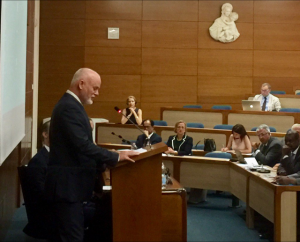As delivered
Opening remarks by Peter Thomson, President of the UN General Assembly, at the conference “Oceans, caring for a common heritage” organized by the Holy See
4 July 2017
Excellencies,
Distinguished participants
Ladies and Gentlemen,
It is a great honour to be with you today here in Rome. I warmly welcome this initiative as we continue the mission of preserving the health of the Ocean and the sustainability of its resources.
I thank the Holy See and the other organizers for their kind invitation to address you today.
Your Eminence, Excellencies, Ladies and gentlemen,
When 193 UN Member States adopted the 2030 Agenda for Sustainable Development, they (acknowledged/ recognized), through the inclusion of Sustainable Development Goal 14, that the time had come to us to recognize the problems that accumulated human activity had put upon the Ocean. As the Global Ocean Commission put it, the time had come to reverse the cycle of decline in which the Ocean was caught.
Bringing SDG 14 into existence was a great step forward, but its true integrity lay in the degree to which its targets were being implemented.
To provide the accountability, momentum and assess what was required, the Ocean conference was held at UN headquarters in New York last month. The Conference was a landmark moment for the realization of the Ocean Goal, and has been judged to have successfully achieved its two central objectives.
The first of those was to raise global consciousness of the Ocean’s value to us all, of the peril in which we have placed it, and of the solutions that exist through the faithful implementation of SDG 14.
I am honoured to record in Rome today that it was Pope Francis who led the way too in this regard, lending his moral authority and global appeal to this noble cause through the encyclical “Laudato Si’”
As we approached the Ocean Conference, the creative and artistic communities, for example, Sir David Attenborough of the BBC and renowned filmmaker James Cameron, brought the case for the Ocean’s protection to their global audiences through heartfelt imagery and truthful advocacy on film.
An entire network of actors, from civil society, the scientific community and the private sector weighed in. Together, we communicated to the world’s governments and the global public the richness of the Ocean’s threatened biodiversity, its significance for coastal communities, for the global economy and for the profound joy of relating to it.
We highlighted the fundamental role of the Ocean in combatting climate change and the fact that the Ocean remains a reservoir for the bulk of our planet’s water, providing us with the oxygen we need for every breath we take.
And second was that the Ocean Conference succeeded in producing the remedial action required to conserve and sustainably manage the Ocean and its resources. We now have the solution to the Ocean’s problems, what we need is the concerted action by humanity. We are all in this together. It is an urgent challenge, but as we know human induced problems have human produced solutions. As the Holy Father said in Laudato Si’, “we know that things can change”.
The Conference’s ambitious outcome document entitled the Call for Action (that was adopted by acclamation by the United Nations Member States), the solutions oriented discussions of the Conference’s seven Partnership Dialogues and the nearly 1400 voluntary commitments that came forward, have all created a massive work plan to take forward in order to realize the targets of SDG14.
Scientists, policy-makers, the world’s fishing industry, Ocean-oriented companies and the finance sector, Ocean advocates, civil society and young people – all agreed that the establishment of collaborative partnerships for the Ocean is one of the great tasks of our time
I am now confident, ladies and gentlemen, that with this raised global consciousness, with a united and invigorated Ocean community ready to work as one, and with a clear work-plan for the years ahead, we have dramatically improved our chances of realizing SDG 14 targets by 2030.
We must now build on the momentum emerging from the Ocean Conference. In this regard, I applaud the Holy See, and particularly, Cardinal Turkson, Prefect of the Dicastery for Promoting Integral Human Development, for this strong showing of commitment to the Ocean’s well-being.
Healing the Ocean is a sacred task and today’s conference, with its focus on the ethical case for protecting the Ocean, is a very welcome contribution to this subject.
Let us never overlook the cultural centrality of the Ocean for so many peoples. Let us never overlook the Ocean’s gifts of beauty and joy, as so often embodied in art, song and literature.
I hope that today’s event inspires governments, civil society and all other stakeholders present to strengthen their resolve in following the path universally agreed to just one month ago in New York.
This path of partnership and good will commitment is the best we have to ensure our grandchildren, and those that come after them, will enjoy the benefits and the beauty of that great fundament of our planet, the Ocean.
I thank you for your attention.


